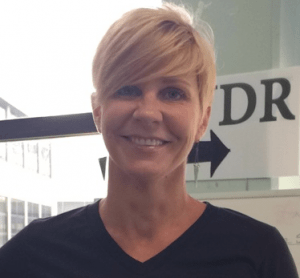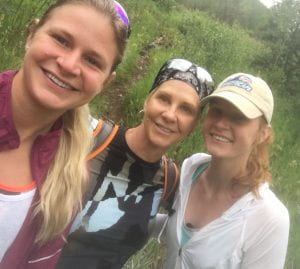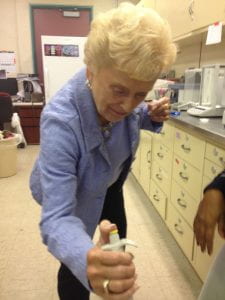Who am I?
 I am a Registered Dietitian (since 1990), with a PhD in Nutrition (2002), and am currently an Associate Professor at Wayne State University in the Department of Nutrition and Food Science (on faculty since 2008). I have experience in the clinical setting, in the laboratory (20 years), in the community (this is relatively new), and in the classroom. What can I say? I’ve been here a while and have had the opportunity to have a lot of different experiences! I love my job, and I love working with students and with people in the community. And I love the freedom I have to search for better ways to do things.
I am a Registered Dietitian (since 1990), with a PhD in Nutrition (2002), and am currently an Associate Professor at Wayne State University in the Department of Nutrition and Food Science (on faculty since 2008). I have experience in the clinical setting, in the laboratory (20 years), in the community (this is relatively new), and in the classroom. What can I say? I’ve been here a while and have had the opportunity to have a lot of different experiences! I love my job, and I love working with students and with people in the community. And I love the freedom I have to search for better ways to do things.
And, this is my family. First, meet Calvin. He was the best dog ever. I’m sure you may have your own opinions on that, but that’s just because you never got to meet Calvin. When Calvin died, I wasn’t ready to replace him so I decided to become a puppy raiser for Leader Dogs for the Blind. I worked to train Scout, knowing that my heart wasn’t ready for another dog. What a silly thought–the heart is always ready for a dog! Scout was career changed (she didn’t make it), and is now part of our family.



Next, my human children, Alyssa and Jenna. And, of course, my mom, learning how to pipette!
Twitter/X
I use my twitter account to follow conversations about diet, climate, and science. I post what I believe will be useful to students studying Nutrition, with occasional personal posts, usually about my dog or the Detroit Lions. Feel free to follow as well, my account is public. I don’t have an agenda or diet to push. Except for an agenda to pursue knowledge based on good evidence. And an honest attempt at open-mindedness to ideas other than my own.
In the lab:
The work we do in the Cress Lab has been quite varied over the past couple of decades. I work as a nutrition expert in the community, in the classroom, and more recently, in the public domain to help promote sound knowledge about the science of nutrition.
In the community, the work of my laboratory has aimed to address issue of access to healthful food, a basic human right. Knowledge about, and access to, healthful food is essential for improving health and addressing the current obesity and diabetes epidemics. Some of the projects most recently under investigation in my lab can be found on the Cress Lab page.
Once upon a time in a previous research life, and with another name (Cabelof), I studied aging, diet and DNA repair mechanisms, to try and understand some of the molecular causes of aging. You can find this information, and some of the terrific people who helped me with this work, on the Cabelof Lab page.
Currently, my focus is on public-facing scholarship. Public-facing scholarship is creative work that includes writing for the popular media, public talks, presentations, and media interviews to provide the public access to sound science information, to address misinformation in science, and to engage the public in scientific discourse. It connects academic research with real-world problems and concerns, fostering public understanding—with an aim to improve scientific literacy.
A Book Project (In progress): Demon Metal or Essential Nutrient? Eating metal is toxic. Not eating metal will kill you. This book is a creative nonfiction work about cobalt. I tell stories about how cobalt is at the same time both toxic to life and essential to life. I aim to connect previously unconnected dots and tell the science of these cobalt-related stories. This crucial metal at the heart vitamin B12 may also be the metal that cost Matisse his ability to hold a paintbrush. A few more perhaps unexpected dots that cobalt connects: beer foam and goiter; sushi and tapeworm; mining, batteries and the Green Revolution; the Montreal Canadienes; and, nitrous oxide and Sir Humphry Davy.
In the classroom:
We work to create spaces for students to learn through involvement, experimentation and collaboration, and to become immersed in a model for engagement and lifelong learning that applies across all disciplines. We work to empower students with essential skills so that working in the community moves beyond volunteerism, and becomes an essential service that meets the needs of the community. You can see the work I do to connect students to the community, here.
Internships:
I develop and manage internships that are designed to provide enriching experiences for students while also providing value to the students of Wayne State and the people of Detroit and southeast Michigan.
 Cress Lab and Resource Platform
Cress Lab and Resource Platform

Hi Dr Cress- I , too, am interested, on a mission, to address iron deficiency in children which ultimately relates to access to food/nutrition education- I have some data I would like to share with you and get your perspective on as far as community approaches to tackle this issue.
Joyce, my apologies that I did not see this until now. Please feel free to contact me at diane.cress@wayne.edu for further discussion
Crohn’s disease in small intestine also results in B-12 malabsorption. Add this too. Thanks
Thank you for your comment. I agree with you. Crohn’s, Ulcerative Colitis, and celiac can all hamper B12 absorption. I didn’t have room in the story to include all the medical conditions that can impact B12. Nor did I mention the genetic predispositions to B12 malabsorption. Both are very important, especially to those individuals with those conditions. Fortunately (?) those individuals are almost always under the care of a physician who tests and treats for B12 deficiency.
Diane, I read your article on B12 deficiency with great interest. I went through oral cancer 8.5 years ago (I don’t smoke or drink) and had surgery, radiation and chemo. Consequently, from the radiation, I don’t produce saliva anymore. This is the first time I have heard of saliva playing such an important role in B12 adsorption. I have never been able to get my Hemoglobin back above 12.9gm, I am always very fatigued, even though I have run a few half marathons since then. I have been taking B12 supplement for the past several years, but doctors have never given me any solution. I have thought recently about getting B12 injections. What advice do you have for me? Thank you so much!
Greg, I’m glad you found the story relevant. It’s not appropriate for me to give medical advice, but I would suggest you have blood tests done to assess your status. If dry mouth is preventing absorption in your case, your markers of deficiency should show that and your doctor will know whether you need intervention and what type is appropriate (by mouth or by injection). To start, B12 and MMA levels may be informative. Congrats on the recovery and subsequent marathons!! Diane.
Very useful and informative article Dr Cress about you and your work. Thank you. Comment from All Shops Business Directory manager.
Hi Dr Cress, I find your work fascinating and will so much love to be a part of it one way or another…. Please let me know if it is possible
Thank you. Do you happen to be a student at Wayne State University?
Thanks again for providing the informative post. I have subscribed to your posts and feed. As a systems security student, I must say that I found the post relevant to my subject area. Mobile Open Banking Applications Dissertation All the best.
Great web site you have here.. It’s hard to find high-quality writing like yours these days. I really appreciate people like you! Take care!!
Karya Bintang Abadi
Please I am really fascinated on your researches so far on nutrition and diet and would want to be part of your team as a prospective student this year 2024. I am yet to apply but would want you to recommend me to be part of your team.
Can I join your lab during my MSc in Nutrition and Food science? I love your research interests.
Thanks for the information. Very helpful. I hope to see more posts here in the future. Cheers. Brent at https://calcriminaldefenselawyers.com
Thanks for the post.
https://www.fooddoz.com/
nice website, i like to read the information you share, i will bookmark this and wait for next article. let me put it here.percetakan murah Jakarta
What motivated you to transition from clinical and laboratory settings to working more with the community, and how has your extensive experience in various fields influenced your approach to community engagement and teaching at Wayne State University? Greeting : Telkom University
I appreciate your interest. It’s a long story, but the short version is that I was motivated to do work that I felt would have an impact. I enjoyed my laboratory work as well, but was ready for a change for a variety of reasons.
Why did the author decide to become a puppy raiser for Leader Dogs for the Blind?Regard Telkom University
Thank you for this question! Leader Dogs for the Blind is an excellent organization that provides invaluable resources to the vision-impaired community. I chose to participate in support of the work they do, and also because I had just lost a beloved pet and thought this was a way to give back without getting too attached. I was wrong. I’m very attached to Scout!
What are the main areas of study in the Department of Nutrition and Food Sciences?
Regard Telkom University
Our department has two branches of specialization–Nutrition, and Food Science. You can peruse faculty websites to see the specific types of research being conducted in our Department.
What is the difference between a nutritionist and a food technologist?
Visit us Telkom University
A nutritionist is an individual trained in the nutritional needs of humans and animals. Primarily they are biochemists. A food technologist works on studying and developing food technologies–perhaps technologies that would improve crop yield, or technologies that would improve food safety. There are many other examples of what a food technologist might study, and I refer you to more detailed resources, try the Institute of Food Technologists.
NICE
Great website you have here. It’s hard to find high-quality writing like yours these days. Thank you for your articles. I find them very helpful. I really appreciate people like you! Take care and have a great day ahead!! Homemade curry paste
Absolutely loved this article! Your writing is clear, concise, and really engaging.
Indian Dresses Online
Great post! I really enjoyed your insights. Your perspective is refreshing and thought-provoking. Looking forward to more content like this!
Thank
Gift For Dog Lover